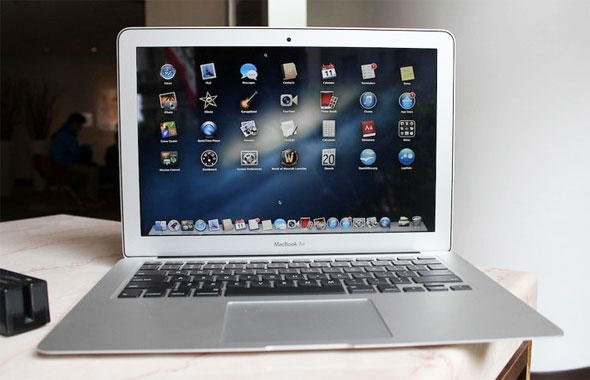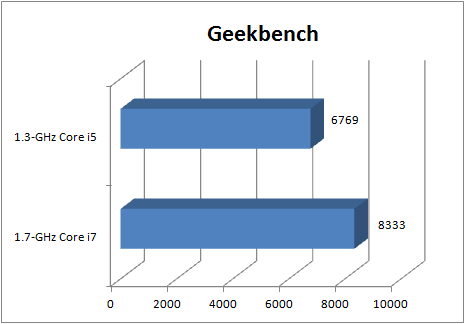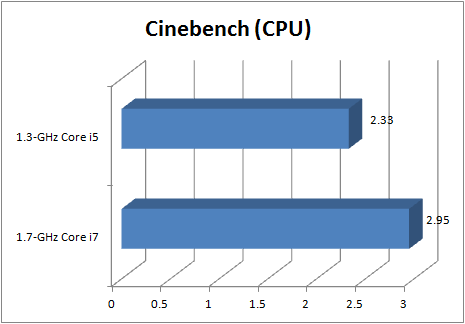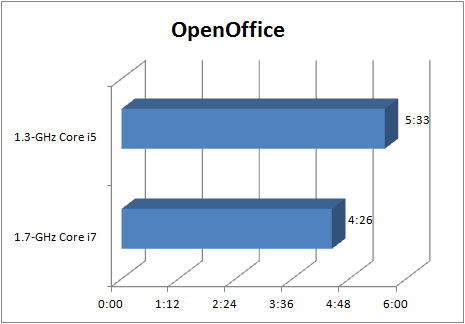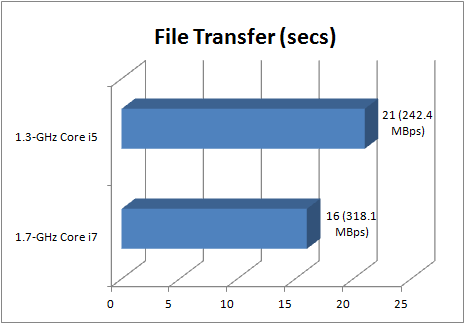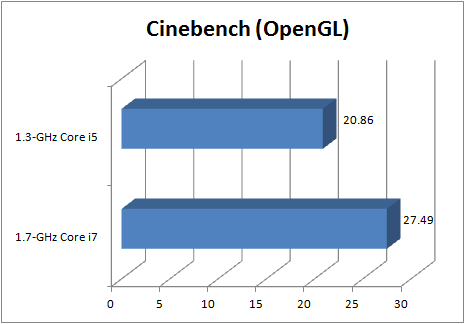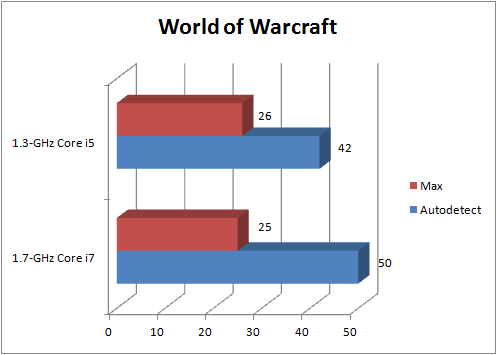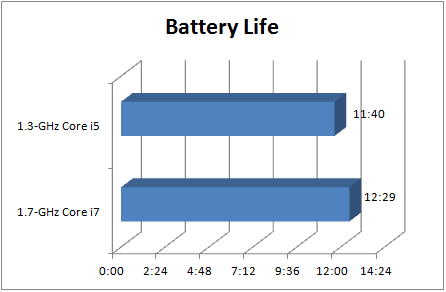Tested: Core i7 MacBook Air (2013) vs. Core i5 Version
When we recently reviewed the 2013 MacBook Air 13-inch, we were impressed not only with its performance, but its epic battery life. Apple's ultraportable lasted nearly 12 hours on our test. However, our review was based on the starting configuration, which costs $1,099. What sort of performance will you get if you upgrade to the $1,549 Core i7 model? We took a tricked-out Air for a spin to see how it stacked up to the base model. Spoiler alert: it's considerably faster and we saw even better endurance.
Specs
First, let's take a look at what you get when you spend $450 on an upgrade.
| Processor | SSD | RAM | Price |
| 1.3-GHz Intel Core i5-4250U | 128GB | 4GB | $1,099 |
| 1.7-GHz Intel Core i7-4650U | 256GB | 8GB | $1,549 |
Apart from the bump up from a 1.3-GHz Core i5 CPU to a 1.7-GHz Core i7 CPU, consumers are also getting double the storage and double the RAM. Let's see how these systems compare in terms of performance.
MORE: MacBook Air 2013 vs. Retina MacBook Pro
Synthetic Tests
Geekbench tests a system's processor and memory, and the CPU portion of Cinebench tests a notebook’s performance by rendering a 3D scene. Not surprisingly, the Core i7 Air scored a good deal higher than the Core i5 version. The Core i7's Geekbench score of 8,333 was more than 1,500 points higher than the Core i5 version of the MacBook Air.
Sign up to receive The Snapshot, a free special dispatch from Laptop Mag, in your inbox.
OpenOffice
In addition to synthetic benchmarks, we also perform several real-world tests to see how a notebook performs during everyday activities. In our OpenOffice test, we time how long it takes a system to pair 20,000 names and addresses in a spreadsheet. The Core i7 Air took 4 minutes and 26 seconds to finish this task, nearly a minute faster than the Core i5 Air.
MORE: 15 Amazing Apple Patents That Tell Your iFuture
Flash Storage Performance
The 256GB of flash storage in the Core i7 Air took just 16 seconds to duplicate 4.97GB of multimedia files, a rate of 318.1 MBps. That's 5 seconds, and nearly 80 MBps faster than the Core i5 Air.
Graphics
Although both Airs have the same Intel integrated GPU, the Core i7 version does benefit somewhat from a faster processor and more RAM. We first tried the OpenGL portion of the Cinebench test, which tests a GPU's OpenGL performance by playing a 3D car chase. The Core i7 Air scored 27.49 to the Core i5 Air's 20.86.
We also saw slightly better performance when playing "World of Warcraft" on the Core i7 MacBook Air. With the displays set to their native resolution, and with effects on autodetect, the Core i7 Air averaged 50 frames per second, where the Core i5 Air managed 42 fps. However, when we increased the effects to the max, both Airs bottomed out at an unplayable 25-26 fps.
MORE: Best Gaming Laptop 2013
Battery Life
One of the key benefits touted by both Intel with its newest 4th generation Haswell processors and Apple with its 2013 Airs is epic battery life. But even these results surprised us. On the LAPTOP Battery Test (Web surfing via Wi-Fi with the screen at 40 percent brightness), the Core i7 Air lasted 12 hours and 29 minutes. Not only does that beat Apple's claim by half an hour, but it bested the Core i5 Air by nearly 50 minutes. The increased endurance could be a result of the higher-speed processors being more power efficient.
MORE: 10 Laptops with the Longest Battery Life
Bottom Line
If you're willing or able to pony up the extra cash for the Core i7 MacBook Air, you'll not only see improved performance, but longer battery life. If you're going to spend $1,549, though, why not just get the $1,499 MacBook Pro with Retina Display? After all, the latest Pro offers a much more colorful and sharper screen.
On the other hand, you can't get a Haswell CPU inside the Pro (yet) and it has a smaller 128GB SSD to start. The Pro also doesn't last nearly as long on a charge--although 7.5 hours is nothing to sneeze at. While not cheap, the Core i7 MacBook Air offers the best combination of speed, portability and endurance in Apple's laptop lineup.
Michael was the Reviews Editor at Laptop Mag. During his tenure at Laptop Mag, Michael reviewed some of the best laptops at the time, including notebooks from brands like Acer, Apple, Dell, Lenovo, and Asus. He wrote in-depth, hands-on guides about laptops that defined the world of tech, but he also stepped outside of the laptop world to talk about phones and wearables. He is now the U.S. Editor-in-Chief at our sister site Tom's Guide, where he oversees all evergreen content and the Homes, Smart Home, and Fitness/Wearables categories for the site..
